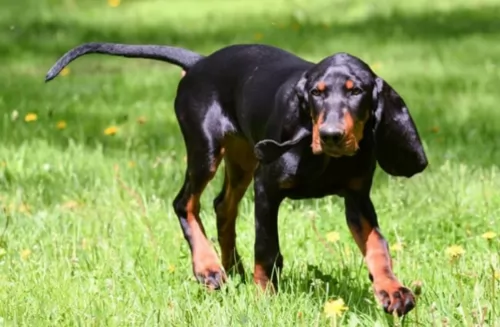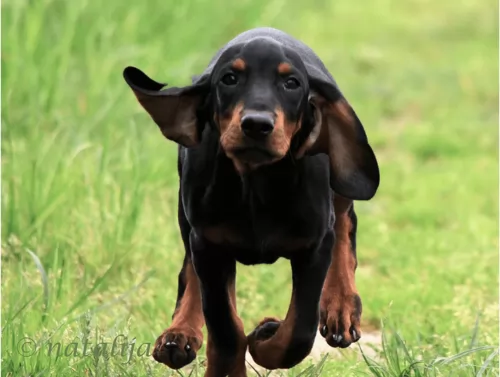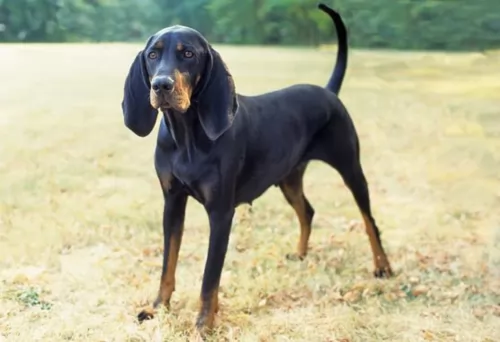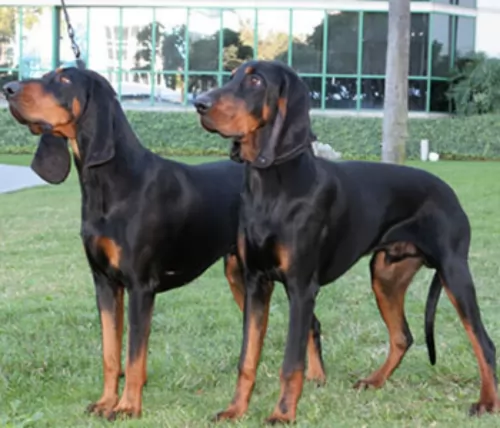 Petzlover
PetzloverBoth Black and Tan Coonhound and Schnauzerdor are originated from United States. Black and Tan Coonhound may grow 7 cm / 3 inches higher than Schnauzerdor. Both Black and Tan Coonhound and Schnauzerdor are having almost same weight. Black and Tan Coonhound may live 3 years less than Schnauzerdor. Both Black and Tan Coonhound and Schnauzerdor has same litter size. Black and Tan Coonhound requires Moderate Maintenance. But Schnauzerdor requires Low Maintenance
 Descendent of the English Talbot Hound, the Black and Tann Coonhound is nevertheless an American creation. Developed by crossing the Black and Tan Virginia Foxhound with the Bloodhound in the very early years of the American experience. It is said that George Washington owned several. The very first Coonhound that was given American Kennel Club registration was the Black and Tan in 1945. They had been admitted to the United Kennel Club in 1912. The Black and Tan Coonhound is a traditional hunting dog – known by hunters as a “trail and tree hound”. This is a dog that finds its prey and trees it. They have incredibly strong instincts to hunt and need to hunt. They can track their prey for miles and if they have a scent you cannot get their attention back. They have been valued because they can “cold track”, following the scent of an animal that left the scene long ago. They are known to have tracked mountain lions and bears as well as deer and coon. They were developed to keep the American settlers safe and well fed, but also to keep them company on the trails or by the fireplace. They are the American Dog.
Descendent of the English Talbot Hound, the Black and Tann Coonhound is nevertheless an American creation. Developed by crossing the Black and Tan Virginia Foxhound with the Bloodhound in the very early years of the American experience. It is said that George Washington owned several. The very first Coonhound that was given American Kennel Club registration was the Black and Tan in 1945. They had been admitted to the United Kennel Club in 1912. The Black and Tan Coonhound is a traditional hunting dog – known by hunters as a “trail and tree hound”. This is a dog that finds its prey and trees it. They have incredibly strong instincts to hunt and need to hunt. They can track their prey for miles and if they have a scent you cannot get their attention back. They have been valued because they can “cold track”, following the scent of an animal that left the scene long ago. They are known to have tracked mountain lions and bears as well as deer and coon. They were developed to keep the American settlers safe and well fed, but also to keep them company on the trails or by the fireplace. They are the American Dog.
With these modern day mixed-breeds, there is no history or records of when they came into being so we assume the USA. And so it it with the Schnauzer Lab mix breed. Each of the parent dogs – the Schnauzer and the Labrador, have their own histories.
It is uncertain how the Schnauzerdor came into being. Not so long ago, puppies born from different parents were simply labeled mongrels, but today they have been specifically bred. With these dogs you are never really sure how the puppies will turn out, and even within one litter, the puppies can be different looking.
 The Black and Tan Coonhound looks like we all imagine a coonhound would look. They have strong and muscular legs, an oval skull and a scissors bite. They have brown or hazel eyes that are very expressive. The ears of course are long like the bloodhound, far back on the head and thin. His nose is amazingly sensitive as he is scent hound. His nostrils are always black. He is a large, strong dog.
The Black and Tan Coonhound looks like we all imagine a coonhound would look. They have strong and muscular legs, an oval skull and a scissors bite. They have brown or hazel eyes that are very expressive. The ears of course are long like the bloodhound, far back on the head and thin. His nose is amazingly sensitive as he is scent hound. His nostrils are always black. He is a large, strong dog.
A Schnauzer Labrador or Schnauzerdor is much the same size of the Labrador if the parents were a Labrador and a standard Schnauzer.
You can expect the height to be roughly between 50 to 62cm and weight could be anything from 20 to 35kg. Everything will depend on the size of the Schnauzer really as there are 3 kinds – miniature, standard and giant.
There’ is no way of knowing what physical characteristics the Schnauzerdor will get from each parent. The coat of these dogs can be anything from smooth to wiry and they can also be in a number of different colors, from yellow to cream, grey, black, brown.
Schnauzers and Labradors are intelligent dogs so the Schnauzerdor is guaranteed to turn out smart. Make sure that your Schnauzerdor receives training and socialization. Clever dogs like this won’t battle with training and it can ensure your pet is obedient and balanced, knowing how to behave around different people and in different situations.
Schnauzers are considered non-shedding and hypoallergenic, so it could be that your Schnauzerdor ends up with a low shedding coat.
Your dog is likely to be social, playful, energetic and a good watchdog. They are loving and loyal to their human family members.
 The Black and Tan Coonhound is intelligent, calm, affectionate, independent, strong, and stubborn. They love children and are gentle with them, but they are also very independent and may not do what the child wants them to do in play. They are loyal to their family and will bay at strangers. They are incredibly adaptable and happy-go-lucky. They will end up on the couch or bed so don’t try to fight it. They like cars and enjoy traveling. If you get a BTC be ready for that booming voice.
The Black and Tan Coonhound is intelligent, calm, affectionate, independent, strong, and stubborn. They love children and are gentle with them, but they are also very independent and may not do what the child wants them to do in play. They are loyal to their family and will bay at strangers. They are incredibly adaptable and happy-go-lucky. They will end up on the couch or bed so don’t try to fight it. They like cars and enjoy traveling. If you get a BTC be ready for that booming voice.
The Schnauzer Lab is a crossbreed so this essentially means that your dog can have behavioral traits from either of the parents.
They're social, friendly, loving dogs that can also make good watchdogs. The Schnauzerdor gets on well with children and can get on with other dogs too. With training and socialization he becomes much more amicable and obedient, making a super family companion.
You can be sure that he is going to make your family a great playmate, friend and pet.
Your Schnauzerdog can live to be between 10 and 14 years of age if looked after well. There are some dog illnesses that many dogs succumb to, regardless of breed or age -
Hip dysplasia is when the hip joints don’t develop properly. You notice your dog is reluctant to play and even battles to get up again after lying down. Hip dysplasia can lead to painful arthritis and you will need to get him to the vet for pain relief and a treatment plan.
This dog loves his food, and because you love him so much, it will be tempting to pop treats into his mouth all the time. It is so easy to overfeed these dogs and obesity is a big problem and can contribute to joint problems with a dog as well as strain on the heart and other organs.
 This coonhound is a big, rugged, working dog and needs to be fed accordingly. Feed him at least twice a day in smaller portions and not right before or right after exercise. Don’t send him on a hunt with a full stomach. Don’t overfeed.
This coonhound is a big, rugged, working dog and needs to be fed accordingly. Feed him at least twice a day in smaller portions and not right before or right after exercise. Don’t send him on a hunt with a full stomach. Don’t overfeed.
Not that the Black and Tan Coonhound is lazy, but he can be a couch potato when he is not working. He needs moderate exercise everyday and he does well at activities like barn hunt and field games. If he does catch a scent outdoors and he is not confined in a fence, he will follow the scent with no attention to your calls at all. He can run for miles on end when pursuing prey, but he’d also enjoy just jogging along side you or your bike. He loves long walks but make sure he is on a leash and can’t follow his nose.
Check your Schnauzerdor’s ears and eyes for infection. Look inside his mouth and check for bad teeth. When you brush him twice a week, check him over for new lumps.Trim his claws.
Your Schnauzerdor is an active dog and he will require vigorous exercise every day. A daily walk won't be enough for this dog. He will want runs in the park off his leash as well as rope- and ball games.
Give your Schnauzerdor the best chance to enjoy good health by providing him with good food.
There are some good commercially manufactured dog foods out there and they can be a good, convenient choice, especially if you choose the high quality ones known for their wholesome, natural ingredients.
Give him some home-made food too which can be added into the dry kibble twice a week. Boil brown rice and chicken in a pot and add in sweet potatoes, carrots and spinach. Chop all this up and as a treat, add some of this into the dry kibble.
Your dog’s wagging tail will be all the thanks you need. Try to also include some raw meat occasionally. Never leave your pet without a constant source of fresh, cool water.